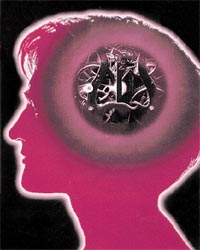Brain as a machine
 the brain is a complex organism that is still not well understood. It can pick a voice of a particular person in a crowded room. It can recognise the face of someone known to you from an extremely crowded room. That kind of processing is difficult to do even with a computer. Now scientists at Boston University, usa , have made significant progress in developing a new generation of high-fidelity instruments of what they call "biologically-inspired electronics'.
the brain is a complex organism that is still not well understood. It can pick a voice of a particular person in a crowded room. It can recognise the face of someone known to you from an extremely crowded room. That kind of processing is difficult to do even with a computer. Now scientists at Boston University, usa , have made significant progress in developing a new generation of high-fidelity instruments of what they call "biologically-inspired electronics'.
Neurons are pulse-conducting cells, and the human body has more than 10 billion, mostly in the brain. Research shows that the neurons are interconnected, and therefore they can influence human behaviour. That suggests that the number of interconnections is huge, maybe as high as a trillion.
The brain's neurons are biological equivalents of transistors, yet they "fire' slowly in comparison to the numerous signals they need to encode. Physicist Douglas Mar of the Boston University says that a baseball is in the "hitting zone' for only a few milliseconds, whereas individual neurons often take 10 milliseconds or more between firings.
Scientists have now created a mathematical model of a neuronal network that works by "inhibitory coupling,' in which one neuron momentarily suppresses the level of activity in other neurons in the network. "Not only does it work, but it seems to work really well,' Mar said. Scientists say the next step would be to see whether they can translate their model into a functioning electronic device.
Some experts believe that the Boston team will not be able to build a "biologically inspired' electronic system that does everything the brain does. Neurons in the brain die. Some of them come back from the dead, and some of them don't, yet the brain continues to function. However, in electronics, if a transistor stops functioning, the whole system can collapse. So, they say, the human brain is likely to remain in a class by itself for a long, long time.
